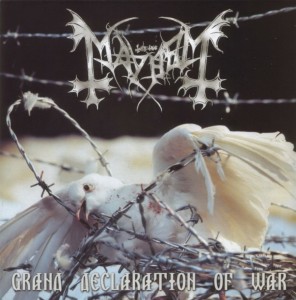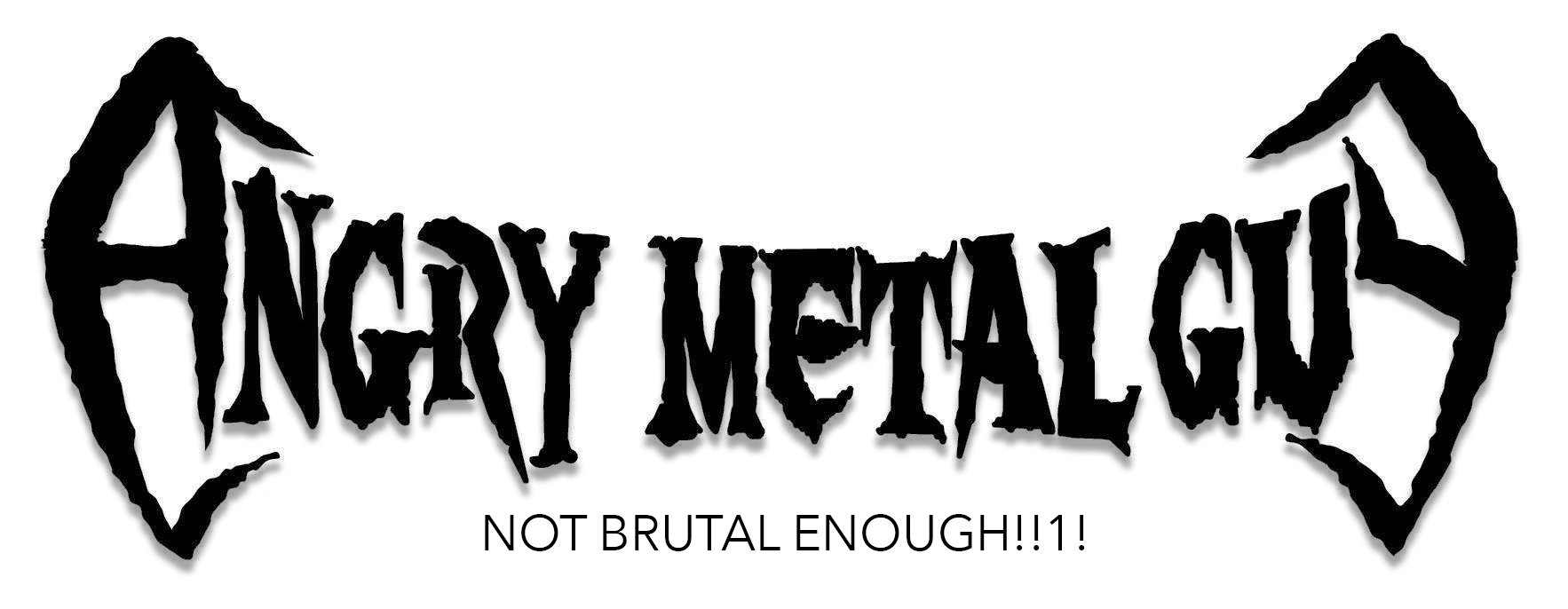Every once in a while the metal scene collectively pisses on a band or record and someone needs to step up and defend why they like it. I normally don’t spend a lot of time defending shitty records, but sometimes genuinely interesting or good records get lampooned by an overly conservative heavy metal scene and that calls for a professional contrarian to defend it! If ever there ever a professional contrarian, it would be me. So here I am to re-hash a record from my past that I still love that everyone else seems to have soured on (or never liked in the first place).
 I was just a metal pup when Grand Declaration of War was released. At that point, I was just cutting my teeth on extreme metal that wasn’t on Century Media and posting regularly at AOL’s Unholy Metal board (-I-). And when I picked up Mayhem’s Grand Declaration of War and bragged about it because I thought I was kvlt, I was astounded at the response that I received. Fifteen metal grognards telling me that the new Mayhem record was “gay and unmetal” and everyone started calling them Gayhem. But what was there to hate about this record? While I understand more now what they were complaining about (having become a bit of a metal-grognard myself [Get off my lawn! — AMG]), I still think that Grand Declaration of War is an under-appreciated record. Let me wax poetic about it.
I was just a metal pup when Grand Declaration of War was released. At that point, I was just cutting my teeth on extreme metal that wasn’t on Century Media and posting regularly at AOL’s Unholy Metal board (-I-). And when I picked up Mayhem’s Grand Declaration of War and bragged about it because I thought I was kvlt, I was astounded at the response that I received. Fifteen metal grognards telling me that the new Mayhem record was “gay and unmetal” and everyone started calling them Gayhem. But what was there to hate about this record? While I understand more now what they were complaining about (having become a bit of a metal-grognard myself [Get off my lawn! — AMG]), I still think that Grand Declaration of War is an under-appreciated record. Let me wax poetic about it.
First, part of the problem is of course Mayhem’s position in the black metal pantheon. They are Mayhem: the world’s most extreme band. Sure, you might not agree, but how many of your most extreme bands had a guitarist that got stabbed 41 times in the head, and a singer who committed suicide – only to end up on the front cover of the band’s demo. So when Mayhem produced a record that starts out with a military march, easily understandable vocals and no blast beats 4 minutes and 14 seconds of the record (title track “A Grand Declaration of War”), people were pissed. And then, when “In the Lies whereupon You Lay” starts, with its characteristic weird time, heavily triggered drums and vocals that sound like Maniac was reading from Mussolini’s diary with the style of a beat poet, people got turned off. And after Wolf’s Lair Abyss, that’s understandable on one level.
But what I dig about this record is how idiosyncratic it is while simultaneously being extreme. This was done in a few ways, through the guitar work, the drum work and most importantly, through the lyrics. Let’s start with the latter first. Maniac’s lyrics on this record are basically a black metal manifesto. Lyrics condemning the soft weakness of Christianity and extolling the virtues of the radical individualism of black metal—but not constructing the individual as neutral, instead constructing the perfect individual is cold and powerful—and evil. “Take a look into our minds / Feel the pulse of omnipotent strength / Take a look into our souls / Feel your life drained of everything.” Sure, these could be construed as “run-of-the-mill” black metal lyrics—but the band didn’t just scream them, instead they’re offered like some kind of twisted poetry reading or something. The message is impossible to miss, and it’s genuinely extreme.
 The drum work is probably the most easy to criticize on this album. While Hellhammer is a tremendous drummer—one of the best in the genre (listen to “A Time to Die”)—the drum sound gets pretty fucking frustrating. Grand Declaration of War suffers from a glut of overly triggered drum sounds and really clean production. It’s also way too loud (but so was Wolf’s Lair Abyss) and it really was a decade defining album in terms of sound qualities—the 2000s will be remembered for their sickly triggered drums and ridiculously over-the-top loud mixes. The up side of this, however, is that Blasphemer’s guitar work is out of this world and comes through sharp as a razor in the mix. I have never heard a record that sounds like this before or after. Blasphemer has a unique style that wanders, weaves and defies the tropes of black metal—while still feeling really black metal. These riffs just leap out of the speakers and speak to me in their extremity and progressiveness. It’s weird. It’s cool. It’s not Mayhem like you think of it—á la De Mysteriis Dom Sathanas—but it’s extreme.
The drum work is probably the most easy to criticize on this album. While Hellhammer is a tremendous drummer—one of the best in the genre (listen to “A Time to Die”)—the drum sound gets pretty fucking frustrating. Grand Declaration of War suffers from a glut of overly triggered drum sounds and really clean production. It’s also way too loud (but so was Wolf’s Lair Abyss) and it really was a decade defining album in terms of sound qualities—the 2000s will be remembered for their sickly triggered drums and ridiculously over-the-top loud mixes. The up side of this, however, is that Blasphemer’s guitar work is out of this world and comes through sharp as a razor in the mix. I have never heard a record that sounds like this before or after. Blasphemer has a unique style that wanders, weaves and defies the tropes of black metal—while still feeling really black metal. These riffs just leap out of the speakers and speak to me in their extremity and progressiveness. It’s weird. It’s cool. It’s not Mayhem like you think of it—á la De Mysteriis Dom Sathanas—but it’s extreme.
Finally, though Grand Declaration of War is a remarkably good record as a whole. At 45 minutes, it is short, with a perfect B-Side starting with the extraordinarily controversial “A Bloodsword and Colder Sun” which sounds like EBM, not black metal at all. But the intelligence with which this was done still impresses me to this day. And while the more experimental material definitely scared people away, I think it’s pretty hard to argue with tracks like “A Time to Die,” “View from Nihil,” or “Crystalized Pain in Deconstruction.” I’m actually even a bigger fan of the long and very creepy “Completion in Science of Agony,” which nearly is 10 minutes long and summons up pretty frightening imagery. And as an added bonus, the opening riff of the album is a continuation of “Symbols of Bloodswords” from Wolf’s Lair Abyss. The record is smart in a way we’re not used to from black metal musicians—or at least weren’t then.
So for those of you who have never taken the time to listen to this piece of black metal controversy, I think you should. It is a weird record that stands alone in the grand scheme of black metal as a scene. But it’s a very cool record, which deserves some thought, attention and an open mind.
Credit where credit is due: apparently Deciblog beat me to this one a long time ago.


















